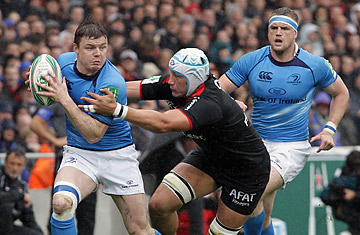
Leinster's Brian O'Driscoll, far left, breaks through the challenge of Patricio Albacete of Toulouse, center, with Leinster's Jamie Heaslipt, during their Heineken European Cup semifinal rugby match in Toulouse, France.
It may boast a world crown, a pair of European titles, and an army of star players who shine in foreign leagues, but French soccer has never managed to attain one thing it's always hungered for: a fan culture as passionately obsessive as that of neighboring England, Italy, Spain and Germany. And on that front, things may be getting worse. As France's scandal-plagued national team heads into next month's World Cup in South Africa under a cloud of gloomy predictions, new evidence indicates "the beautiful game" is now being challenged as France's favorite by the other form of football that originated in England — rugby.
The national soccer team is nicknamed "Les Bleus" for their uniform, but the moniker may also some up the national sentiment over its prospects. France only managed to scrape through to qualify for the World Cup due to Thierry Henry's controversial handball-enabled goal against Ireland; its coach is decried by pundits (and some senior players) as incompetent; two of its stars have been questioned in a police investigation of under-aged prostitution (an inquiry that will continue after the World Cup); and its domestic championship is considered something of a farm league for players looking to make it in the more illustrious leagues of England, Spain, Italy and Germany, where all of France's best players earn their salaries. All of that, and then the fact that some of France's larger teams, like Paris Saint-Germain, have developed a reputation for fan violence completes a gloomy picture of French football, as soccer is called here.
France's National Rugby League (LNR), by contrast, is arguably the best pro championship in Europe. That reputation — and an average salary for players in its Top 14 league of $153,700, versus $123,000 in England — explains why the French league is home to some of the best players from Anglophone countries, such as England sensation Jonny Wilkinson, New Zealanders Tana Umaga and Byron Kelleher, and world champion South African fly half François Steyn. The financial rewards and elite status of the Top 14 also explain why — in the inverse of the French soccer squad — all members of France's national rugby team who formerly played pro ball abroad are now back with French clubs.
Perhaps not coincidentally, LNR sides frequently shine in rugby's Heineken European Cup: Toulouse and Biarritz will square off May 22 in an all-French final.
But rugby may have surged at soccer's expense. Attendance figures for the recently-ended pro rugby regular season show an 11% boost over the previous year, contrasting soccer's nearly 4% slump. Though the average 19,860 fans at Ligue 1 soccer games is still considerably higher than the 13,402 average for rugby's Top 14, rugger is fast closing the gap — over the past six years, soccer stadiums have lost a total of 10% of fans, while rugby's gate has more than doubled. The tables are slowly turning in TV Land too: though the 1.7 million viewers average of soccer matches on pay station Canal Plus far out-guns 700,000 for the Top 14, rugby's offensive has gained ground there, too.
"When we first began broadcasting French rugby 15 years ago, we had to position cameras so the single section full of fans would be in the background, because — in stark contrast to today — stadiums were largely empty back then," says Eric Bayle, lead match commentator and director of rugby at Canal Plus. "The exciting, high-level play of Top 14 rugby is why the sport has gained popularity, though it's true its own image has benefited by comparison to the slumping image of soccer."
Significantly, in some large cities that are home to top teams in both sports, rugby matches are now better-attended than soccer. Three-time European champion Stade Toulousain has welcomed more paying fans to matches than Toulouse Football Club for the past five straight seasons, and this year Paris rugby club Stade Français' 34,722 per-match average bettered violence-marred Paris Saint-Germain's 33,522. Elsewhere, rugby teams are moving their games into nearby pro soccer stadiums to accommodate more fans. Biarritz Olympique even crosses the border, hosting big matches at the 32,000-seat Estadio Anoeta of Spanish soccer team Real Sociedad.
France's Top 14 now rivals England's Guinness Premiership as the continent's best-attended rugby league. But a new $10 million salary cap may put a brake on the flow of foreigners to French teams, as will quotas that will soon require each team to devote 60% of the places in their sides to players developed in France. But while he believes that won't halt French rugby's European surge, Bayle warns against betting on it eclipsing French soccer just yet. "The margins have reduced, but whether it's pro or international play, soccer is still way ahead in terms of TV scores, rights, and revenues," says Bayle. "And football will get a big boost when fortunes of the national team have improved." True, although that could also be a long wait.
